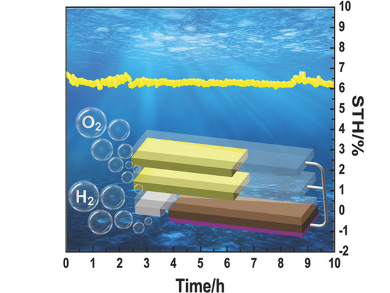Bismuth vanadate (BiV04) is a promising photoanode material for photoelectrochemical (PEC) water splitting and has applications in PEC/photovoltaic(PV) tandem systems for unbiased solar-driven water splitting. To achieve high photocurrent densities in PEC/PV tandem systems, high light adsorption, charge separation, and charge transfer efficiencies are required. However, light adsorption and charge separation efficiencies (ƞabs and ƞsep) are inversely related: thicker films generally result in higher ƞabs while lowering the ƞsep and vice versa.
Gang Liu, Chinese Academy of Sciences, Shenyang, China, Lianzhou Wang, University of Queensland, Australia, and colleagues have developed dual BiVO4 photoanodes with both improved ƞsep and enhanced ƞabs. Transparent, thin BiVO4 films were fabricated by electrodeposition of a bismuth precursor film followed by thermal treatments. The thin BiVO4 films presented well controlled oxygen vacancies which increased the carrier density and electronic conductivity leading to enhanced ƞsep. At the same time, the researchers increased ƞads by layering two identical films to make a dual photoanode that was able to more efficiently use light.
The team studied the PEC water splitting performance after depositing FeOOH/NiOOH dual oxygen evolution cathodes onto the dual BiVO4 photoanodes. This material had a photocurrent density of 5.13 mA cm–2 and a surface charge transfer efficiency at 1.23 V of 95.3 % when compared to the reversible hydrogen electrode.
The researchers finally evaluated the unbiased water splitting performance of the dual photoanodes by placing a sealed perovskite solar cell behind the photoanodes to form a PEC/PV tandem system. The system featured a current density of 5.27 mA cm–2 which corresponds to a theoretical solar-to-hydrogen efficiency of 6.5 %.
- New BiVO4 Dual Photoanodes with Enriched Oxygen Vacancies for Efficient Solar-Driven Water Splitting,
Songcan Wang, Peng Chen, Yang Bai, Jung-Ho Yun, Gang Liu, Lianzhou Wang,
Adv. Mater. 2018.
https://doi.org/10.1002/adma.201800486


